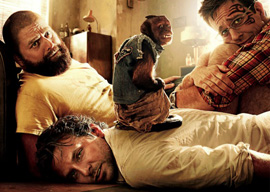
January 11, 2012

The Hangover II
At that price, who needs a real ape? Granted, Serkis, who played Gollum in the Lord of the Rings movies, has been far ahead of anybody else in his nascent field of acting. (He has yet to receive an Academy Award nomination, perhaps because actors who fear they’ll be replaced by computers don’t want to vote for a partially animated character. Yet as his co-star James Franco argues in an essay calling for the Academy to recognize him now—rather than with the inevitable lifetime-achievement Oscar later—performance capture allows actors to stay competitive with animators.) Eventually, though, the supply of actors who can ape apes will expand to meet demand.
As it becomes clear that having men play monkeys is better for all concerned, a similar question will suggest itself: Is it humane to use human children as professional entertainers?
The digital technology enabling adults to portray kid characters is rapidly arriving. Should audiences encourage that switch?
We should definitely consider it. We can all think of child stars who grew up to be sane adults, but the casualty list is long and lurid. A recent study found that 58 percent of retired laboratory chimpanzees show symptoms of depression. What would a study of former child actors find? A consuming hunger to get back into the spotlight and a permanent aversion to a normal job?
One obvious problem is sexual exploitation of ambitious minors. A January 8, 2012 Los Angeles Times story by Dawn C. Chmielewski reports, “At least a dozen child-molestation and child-pornography prosecutions since 2000 have involved actors, managers, production assistants and others in the entertainment industry.” That’s not a huge number—one known case per year—but who can begin to guesstimate the number of unknown cases?
Much of what’s considered big news is driven by plaintiff attorneys who package scandals for the press. The Catholic Church was a particularly juicy target for sex-abuse lawsuits due to its two-thousand-year history as a centralized, deep-pocketed organization. In contrast, the entertainment industry is dispersed and amorphous.
Moreover, man-bites-dog stories make better headlines. For several months, millions of words have been printed about one homosexual pedophile football coach, Jerry Sandusky, in part because of the rarity factor. Scandals involving sleazeball showbiz managers, on the other hand, attract less attention because they are a depressing cliché.
The virtues of virtualizing child characters can be seen in one fiasco averted. In 1990, the first year of The Simpsons, “Bartmania” swept the world. Imagine if The Simpsons had been a filmed show. The little boy who played Bart would now be in his 30s. What would he be like today? Fortunately, Bart Simpson is a cartoon character voiced by a grown woman, Nancy Cartwright.